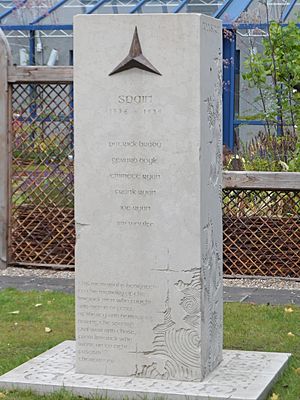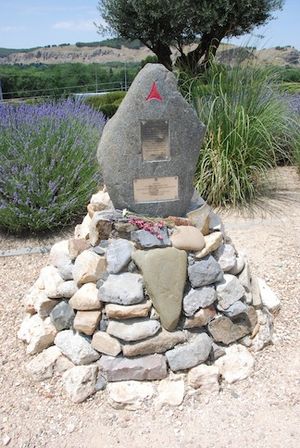Irish socialist volunteers in the Spanish Civil War facts for kids

This article is about Irish Socialist volunteers in the Spanish Civil War. These were Irish people, including members of the IRA and other Socialists, who chose to fight in the Spanish Civil War. They supported the side of the Spanish Republic. These volunteers came from different backgrounds in Ireland, including both Republican and Unionist families. However, they were united by their belief in Socialism and their opposition to the strong influence of the church in politics. Many of these Irish Socialist volunteers later became known as the Connolly Column.
Contents
Why They Fought: The Background
In 1934, some important members of the IRA disagreed with the group's direction. They wanted the IRA to focus more on achieving its goals through the political ideas of Socialism. On March 17, 1934, at a meeting in St. Stephen's Green, Dublin, a proposal for a socialist approach was rejected. Because of this, three key IRA volunteers, Frank Ryan, Peadar O'Donnell, and George Gilmore, left their roles in the IRA.
After this, a new group called the Republican Congress was formed. It was made up of these unhappy IRA members and others who shared their socialist ideas. They met in Athlone in April 1934 to decide what their new group would do. They decided to hold a big meeting every year, starting in September 1934.
Some of these members, like O'Donnell, Ryan, and Gilmore, were later officially removed from the IRA. This happened because they supported the new Congress. Even though they were "stood down" from active IRA service, they often kept connections with the organization.
The Republican Congress
The Republican Congress continued to plan its future. At a meeting in Rathmines in September 1934, there were already disagreements within the new group. Some members wanted to create a "Workers Republic" and form a new political party. Others, like O'Donnell, Ryan, Gilmore, and Edwards, wanted to create a "United Front." This meant uniting working-class people and small farmers to work together. The idea of the "United Front" won the vote.
The Congress slowly broke apart by 1936. It didn't remain a strong political group for long. However, it was very important because it created the network that helped recruit Irish volunteers to fight in Spain.
Fighting in Spain
When the Spanish Civil War began, Peadar O'Donnell and George Gilmore went to Spain for the Republican Congress. They reported back, very excited to support the Spanish Republic. Frank Ryan was very upset that Eoin O'Duffy, a leader with ideas similar to Fascism, was organizing an Irish Brigade to fight for the Fascists. Ryan wrote letters to newspapers criticizing Cardinal MacRory for raising money in churches to support Franco, the Fascist leader.
The Republican Congress started telling people about the Spanish Republican cause at public meetings. Frank Ryan organized the first trips for Irish volunteers. The first groups of men left Dublin, Belfast, and Rosslare in early December 1936. They traveled through France and Britain to reach Spain.
Battles and Campaigns
The first Socialist volunteers fought in the Cordoba area in December 1936. About 135 Irishmen fought alongside French and British soldiers. Their goal was to capture the town of Lopera. Nine Irish volunteers died in this battle.
The Socialist volunteers trained at Madrigueras (Albacete) with the British Battalion. The Irish group was then moved to Villanueva de la Jara in January 1937. Some of the Irish volunteers decided to join the American Lincoln Battalion.
The Irish volunteers then fought in the Battle of Jarama in February 1937. This happened after Franco's army moved into the Jarama Valley. The volunteers also fought in other campaigns, including the advance on Gandesa in 1938 and the important Battle of the Ebro. In these battles, they were part of the XV Brigade.
Coming Home
When the Republican forces were sent home, the Irish group marched to Marsa, then to Els Guiamets, and finally to the demobilization center in Ripoll.
Why They Volunteered
Besides being against Fascism and being inspired by leaders like Ryan and O'Donnell, volunteers gave other reasons for fighting in Spain:
- Riots in Belfast: In 1932 and 1935, there were riots in Belfast. The 1932 "Outdoor Relief Riots" were about people needing help from the government. Many working-class Protestants saw these riots as a reason to support Socialist ideas.
- Political Support: Harry Midgley, a leader of the Northern Ireland Labour Party, supported the Spanish Republic.
- Church's Role: Some parts of the Catholic Church supported Francisco Franco, the Fascist leader. This made many people turn to support the elected Spanish government instead.
- Media Reports: News about the bombing of Guernica in April 1937, and what seemed like unfair reporting in Irish and British newspapers, also influenced them. Frank Ryan also gave radio reports from "Radio Madrid."
- Fighting Fascism Abroad: It felt easier to unite against Fascism in another country than to fight against imperialism and unionism at home.
- Basque Encouragement: Events were held across Ireland, including in the Ulster Hall in Belfast. Representatives from the Basque Country encouraged Irish people to join the fight.
- Continuing the Struggle: Many felt they were continuing a fight that Irish people had been involved in for a long time. William Tumilson, a volunteer, wrote home before he died: "Still determined to stay here until fascism is completely crushed. Impossible to do other than continue on with the slogan of Cathal Brugha: 'No Surrender'."
Their Legacy
The Republican side suffered many losses and eventually lost the war. Those who didn't escape from Spain after Franco's victory were imprisoned. Many Socialists and Republicans managed to get out in time. However, they returned to an Ireland that had changed. There were more rules and restrictions for people who supported the IRA's goals.
Today, ceremonies are still held to remember the role Irish Republicans and Socialists played in the Spanish Civil War. A plaque honoring IRA volunteers from the Short Strand area in Belfast is a place for annual ceremonies. The Connolly bookshop in Dublin keeps items that belonged to the soldiers who fought.
Notable Socialist Irish volunteers in Spain
Ulster

- Arthur Archibald - Belfast
- Archie F Bailey - Belfast
- Victor Barr - Belfast
- William (Bill) Beattie - Shankill Road, Belfast. Killed in the Battle of Brunete on July 25, 1937.
- William Black - Belfast
- Edward G (Ted) Bourne - Belfast
- Joe Boyd - Ulsterville Avenue, Belfast. A paramedic in the Scottish Ambulance Unit.
- Danny Boyle - Belfast. Killed in the Battle of Jarama, 1937.
- Robert Boyle - Belfast
- James Campbell - Derry
- John Campbell - Belfast
- James W Clarke - Belfast
- John Coleman - Belfast
- James C Domegan - Belfast
- Alex Donegan - Belfast
- Charles (Charlie) Donnelly - Dungannon, County Tyrone. Killed in the Battle of Jarama on July 27, 1937.
- John (Paddy) Donovan - Belfast
- Hugh (Pat) Dooley - Belfast
- William Falconer - Belfast
- John (Jack) Flynn - Derry
- Albert F (Willie) Fulton - Belfast
- George F Gorman - Derry. Killed in the Battle of the Ebro, 1938.
- William John Haire - Lurgan, County Armagh
- Pat Hall - Belfast
- James Patrick Haughey - Lurgan, County Armagh
- John Hugh Heeney - Belfast
- Bill Henry - Old Lodge Road, Belfast. Killed in the Battle of Jarama, 1937.
- James Isaac Hillen - Belfast
- Hugh Stewart Hunter - Ballyclare, County Antrim/York Street, Belfast
- William Keenan - Bangor, County Down
- Joseph Kelly - Belfast
- Thomas A Kerr - Belfast
- Jim Lamour - Belfast
- William P (Bill) Laughran - Belfast. Killed at the Battle of Brunete, 1937.
- James Richard (Bill) Lord - Belfast
- Joseph E Lowry - Belfast
- James (or Joseph) Patrick Magill - Lurgan, County Armagh
- Samuel Martin - Belfast
- William Meeke - Bushmills, County Antrim
- Andrew Molyneaux - Belfast
- William A Morrison - Belfast
- John Murphy - Derry
- Patrick K (Paddy) Murphy - Belfast
- Thomas (Tom) Murphy - Monaghan/Belfast
- Basil Andrew (Ben) Murray - Aughnacloy, County Tyrone/Ballymacarrett, Belfast. Killed in the Battle of Aragon 1938.
- Joe Murray, County Antrim
- Richard John McAleenan - Banbridge, County Down
- Paddy McAllister - Belfast (fought with Canadian Mackenzie-Papineau Battalion)
- Paddy "Roe" McLaughlin - Lecamey, Donegal
- Eamon McGrotty - Derry
- Fred McMahon - Belfast. Paramedic in the Scottish Ambulance Unit.
- Paddy O'Daire - Glenties, County Donegal
- Willie O'Hanlon - Belfast
- Dick O'Neill - Falls Road, Belfast
- James Straney - Short Strand, Belfast - Killed in Action during the Advance on Gandesa, Hill 481, 1938.
- William "Liam" Tumilson - Belfast - Killed in Action Battle of Jarama Hill, March 14, 1937.
Other regions of Ireland
- Robert Boyle - Dublin
- George Brown - Kilkenny/Manchester. Killed In Action July 1937.
- Paul Burns
- Paddy Cochrane - Dublin
- Frank Conroy - Kildare
- Kit Conway, Burncourt, Co. Tipperary - badly wounded Battle of Jarama February 12, 1937.
- Peter Daly - Monageer, County Wexford. Wounded in the Battle of Belchite (1937). Died on September 5, 1937.
- Alec Digges
- Eugene Downing - Dublin
- Bob Doyle - Dublin
- Frank Edwards - Waterford
- Rev. Robert M. Hilliard -Killarney, County Kerry. Wounded at the Battle of Jarama and died on February 22, 1937.
- Jackie Hunt - Waterford
- Mike Lehane
- Maurice Levitas - Dublin/London
- Alan MacLarnon - Dublin
- Jack Nalty - Ballygar, County Galway. Killed in the Battle of the Ebro on September 23, 1938.
- Thomas O'Brien - Dublin
- Peter O'Connor - Waterford.
- Eddie O'Flaherty
- Michael O'Riordan - Cork
- Thomas Patten, County Mayo, killed in the Battle of Madrid, December 1936.
- Johnny Power
- Paddy Power
- Maurice 'Mossie' Quinlan, Waterford. Killed in Action Jarama February 17, 1937.
- Frank Ryan
See also
- Foreign involvement in the Spanish Civil War
- Connolly Column
- Abraham Lincoln Brigade - this included Ryan's command in the George Washington Battalion.
- Ireland and the Spanish Civil War
- Irish Brigade (Spanish Civil War) - Irish volunteers who fought for Franco, led by Eoin O'Duffy.
- Ireland–Spain relations
 | Frances Mary Albrier |
 | Whitney Young |
 | Muhammad Ali |

